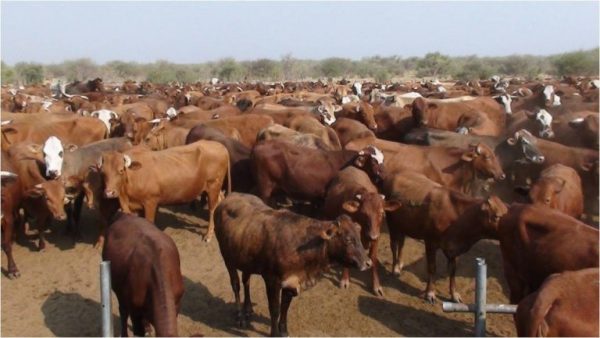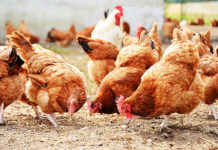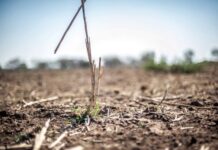Practical and financial barriers associated with reducing carbon footprints and capturing more carbon are standing in the way of beef farmers making the transition to net zero, a report warns.
Those involved in the beef sector in Devon’s ‘Ruby Country’ are taking steps to promote biodiversity and soil health but are being hindered from going further by a lack of clarity about developing policy agendas and future incentives, such as which net zero farming approaches will be subsidised and to what extent.
The report was launched today at the Holsworthy Show and is the result of work between farmers and experts from agricultural research institute, Rothamsted Research, and the University of Exeter.
Other barriers highlighted by the study included concerns over taking land out of food production, and how funding would be secured for infrastructure improvements such as manure storage systems, or the machinery and smaller or specialist equipment that is needed to farm in ways which minimise carbon footprints.
Dr Alice Moseley from the University of Exeter said: “Farmers in our forum were already undertaking actions in support of sustainable farming, whether that’s through organic approaches, using grass-fed cattle with low inputs as part of an integrated farming system, hedge planting or using grass leys in ways that encourage biodiversity. However, they told us a one-size fits all approach to net zero wouldn’t work and they need further support to help with this.
“While they supported a focus on environmental issues within agriculture and land use, they also wanted to see a recognition within policy that farmers also need to make a living – the financial returns for farmers adopting agroforestry for example are very long term. Current financial challenges and changes in the sector make this all the more difficult, with farms having little if any spare cash to invest in new tools or infrastructures necessary to achieve net zero goals. The financial picture in farming currently also makes it much harder for farms to take risks doing things in new ways. Public policy therefore needs to provide the right incentives and levers to enable change to happen within the critical timeframe that is needed to achieve net zero goals”.
Commenting on this point, Andy Gray, a mixed farmer and catering butcher in the Ruby Country said: “We need the policy delivered immediately that allows us to benefit from changing our practices to deliver societal good. We have been let down by slow policy development and delivery.
“There are many barriers slowing farmers steps to net zero, some policy, some societal, some practical. Enthusiasm to change is not a barrier, farmers have an appetite to change. A major consideration is the availability of knowledge. We have lots of science we should be following, there is no central point to access this. We need quick ways to deliver the available science to the farmer, the science needs to be more accessible.”
Meeting six times over spring 2021, the Ruby Country Net-Zero Beef Farming Forum – which was made up of 24 representatives from the wider beef sector in West Devon and Torridge District areas – provided a space for those engaged in the wider Ruby Country beef sector to hear from experts in topics related to net zero, share their experiences and perspectives on these topics, and identify the support necessary to aid their transition to Net Zero.
Amongst the actions which received strong support from the Forum was the use of traditional beef breeds such as the Ruby Red Devon Cattle, as well as the protection and enhancement of the Culm grasslands, a key priority habitat within the Ruby Country which are rich in both carbon and biodiversity but whose area has been much reduced through agricultural intensification.
Whilst Forum members supported the enhancement of the on-farm natural environment it was highlighted that the labour-intensive nature of some of the practices that promote biodiversity and net zero goals – such as hedge laying, woodland management, and mob grazing practices – present challenges that will require support and investment to overcome.
The report also calls for less bureaucratic processes which rewarded not only new but existing agricultural practices which are environmentally beneficial, as well as payment schemes which provide support for smaller and tenanted farms and recognised regional differences.
Co-author Melanie Wright, from Rothamsted Research, said: “Farmers wanted recognition and reward for existing work to promote biodiversity and sustainable farming. Carbon capture, for instance, can be achieved in many ways for example, via hedges, bioenergy crops. trees or soil, with different approaches appropriate on different farms. There is also a need for locally tailored support from processors, retailers and government to support farmers to make transitions to net zero farming. This help should support different routes to market including for smaller and tenanted farms that are a vital part of Devon’s heritage.
“Not all targets outlined by central government and national farming organisations were felt to be appropriate or practical to the Ruby Country beef sector. Farming operates within a complex mix of financial, cultural, political and environmental factors. Each needs to be considered carefully when designing appropriate actions to achieve net zero outcomes. A focus on solely carbon is likely to lead to unintended negative consequences on other aspects of farming and land management and therefore it is imperative to look at the full range of public goods which are derived from our farmed environment before applying broadscale carbon targets.”
The farmers also told researchers they wanted local planning systems which encourage the development of appropriate infrastructure to support net zero goals, county-wide leadership, and a strategic, joined-up approach to green agendas. They argued for the need to make the most of county council assets, such as council-owned farms and land, as well as use of the council’s procurement powers to support consumption of sustainably produced food.
Ms Wright said: “A clear message which emerged from the Forum was that farmers did not support intensifying beef production in the Ruby Country as a means of achieving net zero targets, with Forum members instead favouring measures that promoted greater on-farm efficiencies and maximised the potential of soils, trees and hedges to capture and store carbon in a way that also protects and enhances the Ruby Country landscape.
“The cultural and environmental heritage of the Ruby Country was seen as a key asset for the beef sector going forwards; aligning as it does with a growing consumer demand for high quality, locally produced beef, which is reared in a way that is also good for the environment.”
Recommendations from the Ruby Country Net Zero Beef Farming Forum have been shared with the Devon Climate Emergency Response Group (DCERG) and will form part of the evidence for the new Devon Carbon Plan, which outlines Devon’s path to becoming net-zero carbon by 2050 at the latest.
Dr Moseley said: “We are delighted that the Devon Climate Emergency Partnership have been able to use the findings from the Ruby Country Farmer Forum to inform the development of their Devon Carbon Plan, which itself is the culmination of an extensive consultation exercise involving Devon residents and experts in climate policy and climate science and will set the path to help Devon reach net zero by 2050 at the latest”.
Those taking part in the Forum valued the process of hearing from and talking with experts in the field of net zero, as well as sharing their experiences and concerns with others in the wider Ruby Country beef sector.
Andy Gray said: “The Ruby Country Net Zero Beef Farming Forum was a great example of vital science being discussed in a forum of scientist and farmers. The format allowed us farmers to consider problems and solutions and present practical questions to scientists and academics. We formed relationships that are still delivering creative conversations. The farmers on the forum will certainly have discussed the things they learnt with their peers and friends”
Local farmer and Forum member Olly Walker said: “It was an honour, and my pleasure to be part of the forum. I learned so much and it’s so well put together and considered with some amazing facilitators who took the care and the time to listen, and to make sure everyone’s voice was heard.
“Farmers are so demonised, and they need to be agents of change. Now, they need to be rebranded as the heroes who will fix terrestrial carbon stores and learn to love their soil, its biology and the communities that live beneath their feet”.








